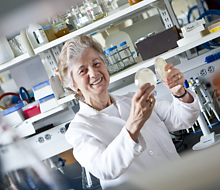 A renowned environmental microbiologist at the University of Maryland has just been recognized for her contributions to fundamental Earth and space science and her unselfish cooperation in research that goes above and beyond any job requirements.
A renowned environmental microbiologist at the University of Maryland has just been recognized for her contributions to fundamental Earth and space science and her unselfish cooperation in research that goes above and beyond any job requirements.
Rita Colwell, a Distinguished University Professor with an appointment in the University of Maryland Institute for Advanced Computer Studies, is the 2020 recipient of the William Bowie Medal, awarded annually by the American Geophysical Union (AGU).
AGU is an international, nonprofit scientific organization that supports 130,000 enthusiasts—from senior researchers to educators to students—interested in Earth and space sciences.
The Bowie Medal is the organization’s highest award. It was established in 1939 in honor of AGU’s first president, William Bowie, who was known for his spirit of helpfulness and friendliness while conducting his own unselfish, cooperative research.
AGU selected Colwell for the medal for her “outstanding contributions to understanding the relationship between microbes and their ocean environment, and the implications for human health.”
Colwell will be honored along with 35 recipients of other AGU medals and awards on Wednesday, December 9 at the AGU20 Fall Meeting, expected to be one of the world’s largest virtual scientific conferences.
Colwell, who is still active worldwide in her research endeavors, is known for conceiving a global network to address emerging infectious diseases and water issues, including safe drinking water for both the developed and developing world.
In 1963, she began studying Vibrio cholerae—the bacterium that causes cholera, a disease that has killed more than 40 million people worldwide and continues to plague developing countries.
She concluded that people were contracting the disease through unsanitary drinking water, and that scientists could use satellites and computer models to accurately predict outbreaks weeks ahead of time, saving millions from infection.
Colwell has authored or co-authored 19 books and more than 800 scientific publications. She has served on editorial boards of numerous scientific journals, including GeoHealth, which she founded at AGU in 2015.
She has been awarded 62 honorary degrees from institutions of higher education, and was the National Science Foundation’s first female director from 1998 to 2004.
Earlier this year, she published a memoir, A Lab of One's Own: One Woman's Personal Journey Through Sexism in Science, which is highlighted in a recent feature story in the university’s Terp alumni magazine.
—Story by Maria Herd